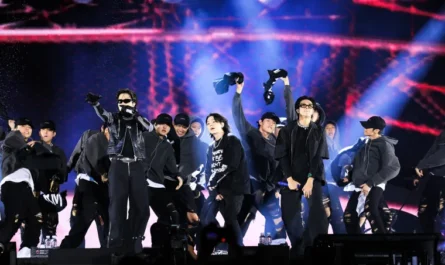As expectations for expanding the K-pop market and the resumption of offline concerts grow, major domestic entertainment stocks are booming. As a result, unlike foreigners and institutions selling stocks in the KOSPI market in June, they bought enter stocks together, leading the stock price to rise.
According to the Korea Exchange on the 22nd, the stock price of Hive, the agency of the world-famous boy group BTS, finished trading at 308,000 won the previous day. In June, Hive shares rose 16.2%. On the 18th, it grew more than 5% and broke the 300,000 won mark for the first time since listing last year. As a result, Hive’s market capitalization rose to 10.97 trillion won.
Since June, the ‘three significant agencies’ SM (22%), JYP (8.7%), YG Entertainment (3.7%) as well as FNC Entertainment (11.4%) rose.
The share price of entertainment shares is rising because album sales are increasing with the growth of the K-pop market, and expectations for the resumption of offline concerts have increased due to the easing of quarantine steps.
According to Hyundai Motor Securities, K-pop album sales in the second quarter of this year (April to June) are expected to reach an all-time high of 17.39 million copies, increasing 80% compared to the same period of the previous year.
Hive is estimated to sell 5.42 million albums thanks to BTS, Seventeen, and TXT. If online concert revenue is added to this, earnings are expected to continue to rise.
Securities analysts are also increasing their interest in Hive. Hyundai Motor Securities raised its target price for Hive by 22.8%, from 285,000 won to 350,000 won, and Mirae Asset Daewoo raised its target price by 14.7%, from 340,000 won to 390,000 won.
Kim Hyun-yong, a researcher at Hyundai Motor Securities, analyzed, “Hive’s earnings are certain to rebound in the second quarter with BTS’ Japanese album, online concert, digital single, and domestic comeback of Seventeen and TXT.”
SM’s album shipments for the two months from April to May also recorded 3.94 million copies, surpassing the record-high quarterly shipment of 3.61 million copies.
Expectations for the resumption of offline concerts are also growing. Health authorities have decided to operate a designated seating system when holding concerts from July and apply the venue’s rules but have agreed to allow up to 5,000 people in stages 2-4. In the case of outdoor concerts, the laws of the platform are applied by arranging seats. Some K-pop singers have already confirmed their concert schedule and announced it.
Entertainment companies are consolidating their position as platform operators is also a positive factor for the share price. For example, Hive runs Weverse, and SM runs fan platforms like Bubble.
“Entertainment companies that used to make money from albums, music sources, MDs, and concerts are increasing their profitability by expanding their platform businesses using their global fandom,” explained Hanwha Investment & Securities researcher Jin-have Jin.
Another factor driving the stock price is the influx of foreigners and institutions who bet on the growth potential of the K-pop market.
In June, foreigners net bought 205.3 billion won in Hive, the third largest among KOSPI listed companies. During the same period, institutions bought SM with 351.7 billion won, the 7th largest among KOSDAQ listed companies. In addition, institutions and foreigners net bought 27.9 billion won and 6.2 billion won, respectively, from YG Entertainment, and 28.5 billion won and 1.2 billion won from JYP, respectively.
In a recent report, CLSA, a foreign securities firm, said, “As the popularity of K-Pop continues, K-Pop album sales are continuously increasing. In particular, despite the absence of new albums from large idols this year, the expansion of the K-Pop fan base promotes new album sales. So did,” he said.
CLSA added, “It will take some more time for K-pop singers’ overseas tours to be held, but the impact of COVID-19 on offline concerts has begun to diminish.”











